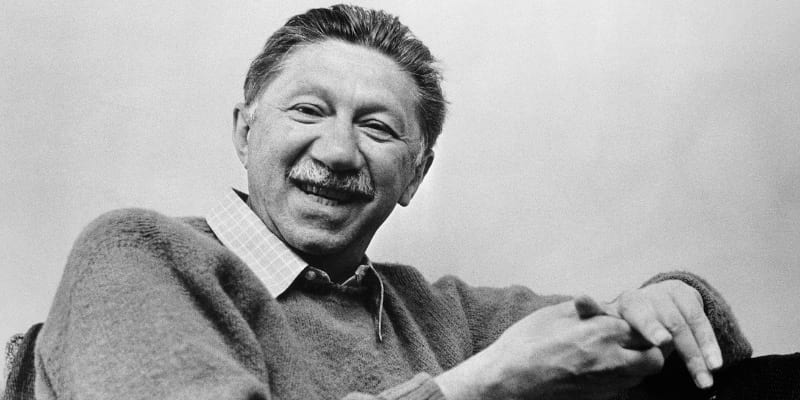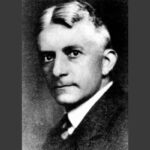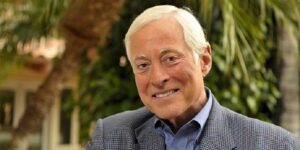Abraham Maslow biografie, theorie en quotes

Abraham Maslow (1908 – 1970) was een bekende Amerikaanse klinisch psycholoog. Abraham Maslow was vooral een specialist op het gebied van de humanistische psychologie en bekend geworden met zijn baanbrekende theorie over menselijke behoeftehiërarchie (hierarchy of needs). Dit model is bekend als de piramide van Maslow.
Abraham Maslow biografie
Abraham Maslow behaalde in 1930 een Bacholor graad (B.A.) in psychologie aan de Universiteit van Wisconsin (Verenigde Staten). In 1931 behaalde hij, na veel rompslomp daar zijn Mastergraad (MSc.) in psychologie.
Zelf was hij niet tevreden over zijn thesis ‘learning, retention, and reproduction of verbal material’ maar zijn begeleider Professor Carson wel. Uiteindelijk leverde dat Abraham Maslow toch twee publicaties op. In 1934 promoveerde (Ph.D.) hij binnen ditzelfde vakgebied.
Hij vervolgde zijn academische carrière aan de Universiteit van Columbia. Samen met mentor Alfred Adler begon hij zijn psychologische ideeën uit te werken.
Na de tweede wereld oorlog ontwikkelde Abraham Maslow op basis van eigen gedachtegoed en onderzoek een nieuwe wetenschappelijke discipline te weten ‘humanistic psychology’.
Samen met twee mentoren, te weten Ruth Benedict en Max Wertheimer begon hij deze discipline verder te ontwikkelen.
De aandachtsgebieden waren mentale gezondheid en menselijk potentieel. Dit zorgde voor de basis van de theorieën: behoeften hiërarchie, metabehoeften, metamotivatie, zelfontplooiing en top ervaringen.
Abraham Maslow was een pionier op dit gebied wat zorgde voor wereldwijde bekendheid. Hij was professor aan verschillende universiteiten in de Verenigde Staten.
Helaas overleed hij op 62 jarige leeftijd aan een fatale hartstilstand.
bekende quotes
- “To the man who only has a hammer, everything he encounters begins to look like a nail.”
- “It isn’t normal to know what we want. It is a rare and difficult psychological achievement.”
- “What is necessary to change a person is to change his awareness of himself.”
- “One can choose to go back toward safety or forward toward growth. Growth must be chosen again and again; fear must be overcome again and again.”
- “Be independent of the good opinion of other people.”
- “Life is an ongoing process of choosing between safety (out of fear and need for defense) and risk (for the sake of progress and growth). Make the growth choice a dozen times a day.”
- “If the essential core of the person is denied or suppressed, he gets sick sometimes in obvious ways, sometimes in subtle ways, sometimes immediately, sometimes later.”
- “The most stable, and therefore, the most healthy self-esteem is based on deserved respect from others rather than on external fame or celebrity and unwarranted adulation.”
- “False optimism sooner or later means disillusionment, anger and hopelessness.”
- “A musician must make music, an artist must paint, a poet must write, if he is to be ultimately at peace with himself. What a man can be, he must be.”
- “If you plan on being anything less than you are capable of being, you will probably be unhappy all the days of your life.”
- “If you only have a hammer, you tend to see every problem as a nail.”
- “What a man can be, he must be. This need we call self-actualization.”
Boeken en publicaties van Abraham Maslow
- 2013, 1962. Toward a psychology of being. Start Publishing LLC.
- 2000. The Maslow business reader. John Wiley & Sons.
- 1998. Maslow on management. John Wiley.
- 1994, 1964. Religions, values, and peak-experiences. Columbus: Ohio State University Press.
- 1993, 1972. The farther reaches of human nature. Maurice Bassett.
- 1973. On dominance, self-esteem, and self-actualization. Maurice Bassett.
- 1970. Motivation and personality. Harper & Row.
- 1969. The farther reaches of human nature. The Journal of Transpersonal Psychology, 1(1), 1.
- 1968. Music Education and Peak Experience. Journal: Music Educators Journal, vol. 54, no. 6.
- 1968. Some educational implications of the humanistic psychologies. Harvard Educational Review, 38(4), 685-696.
- 1967. A Theory of Metamotivation: the Biological Rooting of the Value-Life. Journal: Journal of Humanistic Psychology – J HUM PSYCHOL , vol. 7, no. 2, pp. 93-127.
- 1966. The psychological aspect desacralization. Journal: The American Journal of Psychoanalysis, vol. 26, no. 2, pp. 148-157.
- 1966. The Psychology of Science a Reconnaissance.
- 1965. Art judgment and the judgment of others: A preliminary study. Journal: Journal of Clinical Psychology – J CLIN PSYCHOL, vol. 21, no. 4, pp. 389-391.
- 1965. Humanistic Science and Transcendent Experiences. Journal of Humanistic Psychology – J HUM PSYCHOL, vol. 5, no. 2, pp. 219-227.
- 1965. Self-actualization and beyond.
- 1964. The superior person. Journal: Society, vol. 1, no. 4, pp. 10-13.
- 1963. Fusions of facts and values. Journal: The American Journal of Psychoanalysis, vol. 23, no. 2, pp. 117-131.
- 1962. Lessons from the Peak-Experiences 1. Journal of humanistic psychology, 2(1), 9-18.
- 1962. Some basic propositions of a growth and self-actualization psychology. Perceiving, behaving, becoming: A new focus for education, 34-49.
- 1961. Peak experiences as acute identity experiences. Journal: The American Journal of Psychoanalysis, vol. 21, no. 2, pp. 254-262.
- 1959. New knowledge in human values.
- 1959. Cognition of being in the peak experiences. The Journal of Genetic Psychology, 94(1), 43-66.
- 1958. A Dynamic Theory of Human Motivation.
- 1956. Effects of esthetic surroundings: I. Initial effects of three esthetic conditions upon perceiving “energy” and “well-being” in faces. The Journal of Psychology, 41(2), 247-254.
- 1950. Self-actualizing people: a study of psychological health. Personality.
- 1943. A theory of human motivation.
- 1943. Conflict, frustration, and the theory of threat. The Journal of Abnormal and Social Psychology, vol. 38, no. 1, pp. 81-86.
- 1943. Preface to motivation theory. Psychosomatic medicine, 5(1), 85-92.
- 1942. Self-esteem (dominance-feeling) and sexuality in women. The Journal of Social Psychology, 16(2), 259-294.
- 1941. Principles of Abnormal Psychology, the Dynamics of Psychic Illness. Harper & Bros.
- 1937. Dominance-feeling, behavior, and status. Journal: Psychological Review – PSYCHOL REV , vol. 44, no. 5, pp. 404-429.
Citatie voor dit artikel:
Van Vliet, V. (2012). Abraham Maslow. Retrieved [insert date] from Toolshero: https://www.toolshero.nl/bekende-auteurs/abraham-maslow/
Oorspronkelijke publicatiedatum: 19/01/2012 | Laatste update: 07/12/2023
Wilt u linken naar dit artikel, dat kan!
<a href=”https://www.toolshero.nl/bekende-auteurs/abraham-maslow/”>Toolshero: Abraham Maslow</a>












